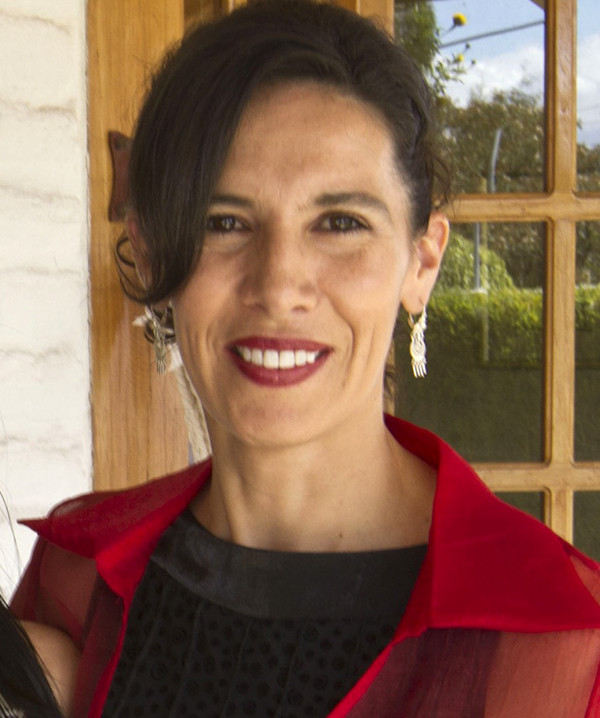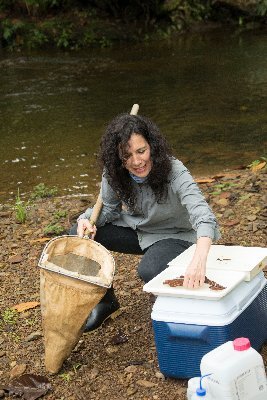International Womenʼs Day is an opportunity to celebrate the social, professional, and cultural achievements of women all over the world. The Galapagos Initiative is home to incredible female leaders and scientists at UNC, USFQ, and at the Galapagos Science Center. For International Womenʼs Day this year, we will showcase seven of these accomplished women throughout the week.

Today, we sit down with Andrea Encalada, freshwater biologist and Vice Rector of USFQ.
How did you come to start working in the Galapagos?
I was lucky enough to come to USFQ 15 years ago as a Biologist with a PhD in Freshwater Ecology. I founded USFQ’s Aquatic Ecology Lab which started out very small and I have enjoyed watching it grow over time. I had done a lot of conservation biology work, and my main motivation was trying to understand freshwater systems. They are everywhere, and I wanted to figure out how they function and how to save them. It was fascinating because there are not a lot of freshwater ecosystems in the Galapagos, but we do have a natural laboratory of evolution. This is a biologists’ dream – a mecca because of the biodiversity in the archipelago.
I have always enjoyed being in the field with my students. I have learned a lot working with them, both in the Galapagos but also through my work in the Amazon basin. It was a great experience to start in a very small lab and grow into this research position. My goal is to shed light on the diversity and ecology of these unique ecosystems while providing tools for conservation and decision making.
How has your role changed over time?
Before I became Vice Rector, my everyday life was research and my students. Now, I have the challenge of interacting with professors at the university level and making changes to the way we do things here. I am looking forward to finding ways to include more diversity on campus and bringing that to the forefront within both education and research.
One of my newer roles is being a Co-Chair on the Science Panel for the Amazon. It is a group of sixty scientists that come together to discuss how the Amazon is functioning, climate change, and other anthropogenic changes. It has been interesting to interact with the different voices of the Amazon, especially many indigenous and campesino women that live there. We have invited women and men that are citizens of the Amazon to be in this group so we can construct a report together about the Amazon’s main problems and their solutions. It is so important to include the point of view of people who live there as well as the scientists that work there. It has really formed my view on how we work with different people.
What women in your life do you look up to?
The first woman in my life is my mother. She resigned from her job to help raise my sisters and I. I can’t remember a relaxed time at home because my mom was always exposing us to new things, encouraging us to join the basketball team, or the running team, or to try piano lessons. She was always running us around in the car everywhere. It was fantastic to be one of four sisters because we never felt we needed to do things any differently than men. My parents encouraged us to try everything.
My other role model was my PhD advisor Bobby Pasarski at Cornell University. She is a super qualified scientist and an incredible mom and wife. It was so empowering because she taught me the importance of a strict schedule and respecting time. She would be completely available to me until she needed to leave for her daughter’s lacrosse game, and then she would be devoted to her family. She showed me that it is possible to be a wonderful scientist and mother at the same time. You can be good at several things, in fact, we need women to be good at several things. We can work hard and play hard. We women are intense, we feel things, but we do not take shortcuts. If we decide to do something, we must do it well, and learn how to say no to some things so we can be all in on other things.
How do you find that balance in your own life?
It is not easy, but it is not impossible. Prioritizing is key. It is necessary to have balance in our lives, but it is an internal struggle.

I became a mom at 22, while my husband and I were both finishing up college. Early on, I had to learn how to manage my time. I wasn’t just looking out for me at that time, but my family. My husband was very supportive, and we divided the work, which we still do to this day! For example, he knew that today I didn’t have time to make lunch before my meeting, so he brought me lunch and a coffee. It can be the little things.
We were not your average graduate students at Cornell, and we had to make some sacrifices. We had our priorities and maintained our schedules so that we could make time for our son and his education. We established some rituals that helped with the organization of the family and made us stronger.
Sometimes, you want to do all the things, but you can’t and you have to sacrifice some in order to do the other things well. You can always try to find balance. That is critical.
What advice would you give future women in STEM?
My advice is to give everything you can. We can do it. There are resources and role models for women now. It is a wonderful moment for women because of all the support. In certain areas of science, some people think women should not be present, but we can work in whatever field we want to. I would encourage everyone to pursue what they think is important- what they like. Look inside for it, fight for it, do it. I think that there are opportunities and there is a passion that women have. We see the world in a different way. It is important to have the wisdom of women because the point of view of a woman is different from a man. Having that perspective will make science better. We have to fight for that because we need more women in science.
Written collaboratively by Kelly Weaver, Director of External Affairs & Communications, Center for Galapagos Studies; and Molly Herring ’23, UNC Global Studies and Biology.

